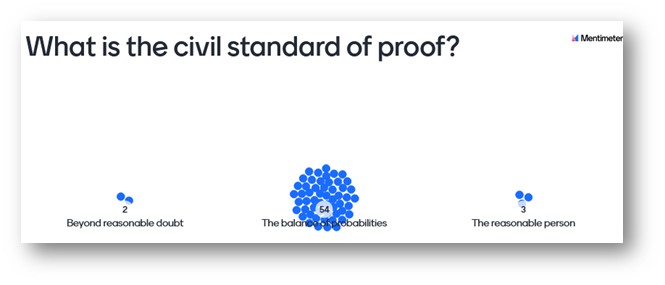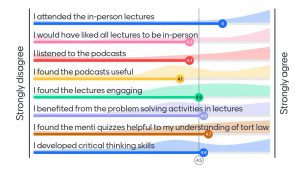Primary materials for teaching tort law are case law and statutes. This year, Dr Gemma Turton experimented with using podcasts in LAWS5001 Torts, to deliver a portion of the unit content outside of scheduled lecture time, to free up lecture time for interactive tasks.
LAWS5001 Torts is a core first-year Juris Doctor (JD) unit of study with approximately 200 students, delivered by HyFlex in 2022.
In this article, I sit with Dr Turton to find out more about this innovative approach.
Lana Kolta: Using podcasts is not a new concept, but it is fairly new to Sydney Law School. What made you decide to use this approach, instead of the usual didactic lecture delivery?
Gemma Turton: I had been wanting to make the lectures more interactive so podcasts were a great way to deliver some content in advance each week, allowing me to flip the classroom during the lecture. There are so many cases to study in tort law and while there are always new cases being decided, a lot of core principles come back to some of the older cases, so a series of podcasts on these key cases is pretty timeless. It was also a way to allow students to hear from colleagues who have a particular interest in each case rather than the same lecturer week in, week out – we have such an expert team who are really passionate about the law, so my hope was that would help spark students’ interest in the cases.
Being able to flip the classroom allowed me to focus on students’ legal skills, engage them in more active learning, and develop cohort building through group activities, at the same time as reinforcing their understanding of the legal principles established in the key case from that week’s podcast.
Lana: How were the podcasts incorporated into students’ learning?
Gemma: In addition to lectures and tutorials, students were provided with short weekly podcasts on key cases, created by members of the torts team. I devised a list of key cases corresponding to each topic and matched them with colleagues’ interests and expertise as best I could, and colleagues also volunteered to record some. The podcasts were created to supplement, not replace, the reading of the judgment extract in the case book and were designed to give students further insights into the case and its impact. They formed the basis for discussion of a short problem scenario in the lecture the following week so were ‘required listening’.

My plan had been to focus on students’ legal problem-solving skills in the lecture, because LAWS5001 are a first-year JD cohort so this is a new skill for them. This is something we do in smaller groups in tutorials, but students often feel uncertain about it and I always say to them that they will improve through practice, so incorporating an opportunity for practice into the lecture helps build their confidence and allows the lecturer to clarify any issues at a whole-cohort level. I generally set a short menti quiz to recap points from the previous lecture and to check their understanding of the podcast case. That meant that I could clear up any misunderstandings before starting the problem-solving activity, and meant that students would have a good foundation of knowledge before engaging with the problem question. That would be important any time, but I think was particularly valuable given that around one-third of our cohort was attending the lecture remotely. I then gave students a problem scenario, in the same style as we set for assessments but much shorter, and based on the legal principles established in the podcast case. As I was confident in their understanding of those principles from the menti quiz, we could then focus on the techniques of identification of a legal issue in a fact scenario, how to articulate a legal principle, and how to reason by analogy with the case law.
An additional benefit of the podcasts was that they helped students with the skill of reading a case. I will confess that was not an aim that I had planned, but it was a happy bonus to get feedback from students that they found the podcasts useful for this. There is a huge volume of cases to read in law, and as lecturers we can easily forget that reading and understanding a judgment and appreciating its significance is a skill that students need to acquire.
The feedback was that listening to an expert explain a case helped students understand what to focus on in their reading and how to go about reading a case. The podcast format definitely helped with this because it allowed us to go into more depth on each case than we might ordinarily have time for in a lecture.

Lana: What training and tools did you have to use to create the podcast series?
Gemma: Following consultation with Education Innovation’s (EI) AV team, we used basic recording tools such as webcam and Zoom with a backup phone voice recorder and uploaded recorded files directly into Canvas. Using familiar technology enabled the teaching team to focus solely on the case they were presenting.
The EI team had recommended the audio-only format of a podcast so that students could listen to the recording on the go, and the feedback from students suggested that they liked this aspect of the podcasts – for some it was an easy way to study during their commute.
Lana: It seems that the podcasts were well received by students, as suggested by the table of views. How do you think it went?
| Week – case name (presenter) | Number of views |
| Week 2 – Platt v Nutt (Mr Ross Abbs) | 264 |
| Week 3 – Nationwide News v Naidu (Dr Chris Rudge) | 156 |
| Week 4 – Marion’s Case (Dr Penelope Crossley) | 133 |
| Week 5 – Chapman v Hearse (Professor Barbara McDonald) | 133 |
| Week 6 – Tame and Annetts (Mr Ross Abbs) | 131 |
| Week 7 – Rogers v Whitaker (Dr Belinda Reeve) | 225 |
| Week 8 – March v Stramare (Professor Barbara McDonald) | 126 |
| Week 8 – Wyong Shire Council v Shirt (Professor David Rolph) | 239 |
| Week 9 – Wallace v Kam (Dr Gemma Turton) | 119 |
| Week 10 – CFMMEU v Personnel (Dr Penelope Crossley) | 162 |
| Week 11 – Barclay v Penberthy (Mr Harrison Simons) | 95 |
Gemma: I was pleased to see the viewing figures stay fairly consistent throughout the semester as that suggests students valued the podcasts and kept listening even when they were busy. At the end of the semester I used Menti to gather informal feedback because I wanted to ask questions about the HyFlex delivery and the activities we did that would not have been captured by the Unit of Study Survey. I used a 6-point scale to ask students to rate some specific aspects of the course, and open questions for wider feedback. There was positive feedback about the podcasts and about the interactive aspects of the lectures that the podcasts facilitated. Students wrote that they loved the menti quizzes and found them helpful to understand the key ideas, they liked that I taught them how to do things rather than just expecting them to know how to do it, they enjoyed applying the principles to fact scenarios, and that I gave tips about problem-solving. Some students were not keen on the group work aspect but said that they found the lectures interactive and engaging.

There is a snapshot of the feedback here, and interestingly our remote cohort scored the usefulness of podcasts the same, and rated the problem-solving and menti quiz activities more highly, perhaps suggesting the flipped classroom is particularly beneficial for remote students attending on zoom.
Lana: The podcasts were created to be timeless, and you can use them again for the future offerings of LAWS5001. Given your experience and student feedback, would you change anything for next year?
Gemma: Next year I plan to work with you as our Educational Designer in the Law School to make a dedicated Canvas page for the podcasts so that they are presented as a key resource rather than just being an additional tab under the ‘modules’ section of our Canvas site. A suggestion in the student feedback was to provide the names of additional cases that are referenced during a podcast because they were not always sure of the spelling so had trouble following up in their reading. I think that would be useful to make the content more accessible because the spelling is not always obvious, so in the Canvas podcast site I would like to add ‘show notes’ with links to the judgment of the main case and any other cases referred to. Another suggestion from a colleague was to make one- or two-minute clips of a key point from the podcast, to play during the lecture, which would help break up the lecture, reinforce the value of listening to the podcast, and further help ensure that everyone is on the same page before doing the problem-solving activity so that’s something I hope to do next year. But one thing I like about the podcasts is that they are a resource available to whoever is delivering the Torts course in a given semester so I am excited to see what other colleagues do with them.
Lana: Thank you Gemma, for your time and expertise, and we are so glad to see great student engagement. I hope you enjoyed creating the podcasts and I look forward to developing this initiative even more next year!
Top tips for podcasting
Keen to try podcasting in your own context? Here are our top tips to get you started:
- Gemma highly recommends booking a consultation with the Education Innovation team – they provide advice and support you in using the best approaches to podcasting. For ongoing support, you can check if your local Educational Designer has some experience or relevant equipment that you can use.
- Create timeless podcasts by choosing topics that will stay current for years to come.
- Keep podcasts under 30 minutes, to include some detail and keep students interested.
- Prepare a script but aim to speak naturally. If you make a mistake, pause and start your sentence again. If appropriate, use it as a teachable moment and explain why it is common to make such mistakes.
- Upload recordings into Canvas as a downloadable file, for students to download and listen offline.





